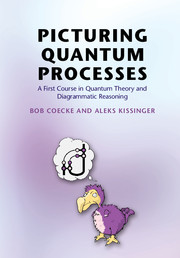Book contents
- Frontmatter
- Contents
- Preface
- 1 Introduction
- 2 Guide to Reading This Textbook
- 3 Processes as Diagrams
- 4 String Diagrams
- 5 Hilbert Space from Diagrams
- 6 Quantum Processes
- 7 Quantum Measurement
- 8 Picturing Classical-Quantum Processes
- 9 Picturing Phases and Complementarity
- 10 Quantum Theory: The Full Picture
- 11 Quantum Foundations
- 12 Quantum Computation
- 13 Quantum Resources
- 14 Quantomatic
- Appendix Some Notations
- References
- Index
12 - Quantum Computation
Published online by Cambridge University Press: 30 March 2017
- Frontmatter
- Contents
- Preface
- 1 Introduction
- 2 Guide to Reading This Textbook
- 3 Processes as Diagrams
- 4 String Diagrams
- 5 Hilbert Space from Diagrams
- 6 Quantum Processes
- 7 Quantum Measurement
- 8 Picturing Classical-Quantum Processes
- 9 Picturing Phases and Complementarity
- 10 Quantum Theory: The Full Picture
- 11 Quantum Foundations
- 12 Quantum Computation
- 13 Quantum Resources
- 14 Quantomatic
- Appendix Some Notations
- References
- Index
Summary
In the Name of the Pasta, and of the Sauce, and of the Holy Meatballs …
– Bobby Henderson, The Gospel of the Flying Spaghetti Monster, 2006After the conceptual comes the practical. While the study of quantum foundations is as old as quantum theory itself, the field of quantum computing is relatively new. So new in fact that large-scale, practical quantum computing is still not a reality. A typical ‘quantum computer’ takes many months to set up before performing such astounding tasks as factoring 6 into 3 × 2. Nonetheless, if those machines would exist, we know that we would gain amazing speed-ups in solving some hard (classical) computational problems, such as those involved in breaking a huge portion of cryptographic systems in use today.
Before we get into ‘quantum computing’, we should say a couple of things about ‘computing’. What is computing? Our answer by now probably won't come as such a shock: it's a process theory! Computation is indeed all about wiring the inputs and outputs of small processes together to make bigger processes. More specifically, a computation consists of a (finite) set of basic processes, which are wired together according to some (also finite) instructions, which we refer to as an algorithm or simply a program.
The only essential difference between classical and quantum computation is the contents of the basic processes. For classical computation, these operations consist of things like logical operations (e.g. XOR) or reading/writing locations in memory. For quantum computation, we can extend this with quantum processes and classical-quantum interactions such as measurements. So quantum computing is all about figuring out how to write new kinds of programs that exploit these new building blocks to build faster algorithms or accomplish new kinds of tasks that aren't possible classically.
The first quantum algorithms were ‘proofs of concept’, in the sense that they solved some problem much faster than a classical computer, but the kinds of problems they solved were not particularly interesting in their own right. However, this changed drastically with the advent of Grover's quantum search and Shor's factoring algorithms.
- Type
- Chapter
- Information
- Picturing Quantum ProcessesA First Course in Quantum Theory and Diagrammatic Reasoning, pp. 679 - 736Publisher: Cambridge University PressPrint publication year: 2017

